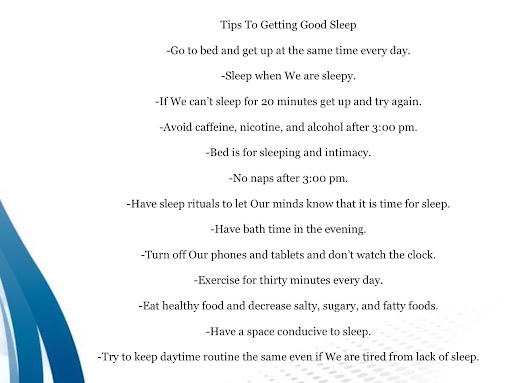Simply Having Healthy Sleep Habits
When I’m not sleeping well I have difficulty concentrating, I have short term memory problems, I have a shorter fuse, and I feel fatigued and tired all day.
There are many medications which are used to treat insomnia, but they are usually only effective for a little while and they can have unwanted side effects.
The best thing to do is to develop good sleeping habits.
“Sleep Hygiene” is the medical term used to describe having healthy sleeping habits.
Here are fifteen Sleep Hygiene tips that can provide long term solutions to insomnia.
-Get regular
One of the best ways to train our bodies to sleep well is to go to bed and get up at more or less the same time every day, even on weekends and days off. This regular rhythm will make us feel better and will give our bodies something to work from.
-Sleep when sleepy
Only try to sleep when we actually feel tired or sleepy, rather than spending too much time awake in bed.
-Get up and try again
If we haven’t been able to get to sleep after about 20 minutes or more, get up and do something calming or boring until we feel sleepy, then return to bed and try again. Sit quietly on the couch with the Lights off, or read something boring. Avoid doing anything that is too stimulating or interesting, as this will wake us up even more.
-Avoid caffeine and nicotine
It is best to avoid consuming any caffeine or nicotine for at least 4 to 6 hours before going to bed. These substances act as stimulants and interfere with the ability to fall asleep.
-Avoid alcohol
It is also best to avoid alcohol for at least 4 to 6 hours before going to bed. Many people believe that alcohol is relaxing and helps them get to sleep at first, but it actually interrupts the quality of sleep.
-Bed is for sleeping
Try not to use our beds for anything other than sleeping and sex, so that our Bodies come to associate bed with sleep. If we use our bed as a place to watch TV, eat, read, work on our laptops, pay bills, and other things, our bodies will not learn this connection.
-No naps
It is best to avoid taking naps during the day, to make sure that we are tired at bedtime. If we can’t make it through the day without a nap, like me, make sure it is for less than an hour and before 3 PM.
-Sleep rituals
We can develop our own rituals of things to remind our bodies that it is time to sleep. Some people find it useful to do relaxing stretches or breathing exercises for 15 minutes before bed each night, or sit calmly with a cup of caffeine free tea. I like to read boring historical nonfiction, it puts me right out.
-Bath time
Having a hot bath one to two hours before bedtime can be useful, as it will raise our body temperature, causing us to feel sleepy as our body temperature drops again. Research shows that sleepiness is associated with a drop in body temperature.
-No watching the clock
Many people who struggle with insomnia tend to watch the clock too much. Frequently checking the clock during the night can wake us up and reinforces negative thoughts about not being able to sleep.
-Exercise
Regular exercise is a good idea to help with good sleep, but try not to do strenuous exercise in the four hours before bedtime. Morning walks Are a great way to start the day feeling refreshed!
-Eat right
A healthy, balanced diet will help us to sleep well, but timing is important. Some people find that an empty stomach at bedtime is distracting, so it can be useful to have a light snack, but a heavy meal soon before bed can also interrupt sleep.
-Have the right space
It is very important that our beds and bedrooms are quiet and comfortable for sleeping. A cooler room with enough blankets to stay warm is best, and make sure we have curtains or an eye mask to block out early morning light.
-Keep daytime routine the same
Even if we have a bad nights and are tired it is important that we try to keep our daytime activities the same as we had planned. That is, don’t avoid activities because we feel tired. This can reinforce the insomnia.
Of course it’s very important to talk to our health care providers about what is right for us, but they will probably recommend good sleeping habits as an important part of treating insomnia, either with medication or alone.
When we sleep well, we wake up feeling refreshed and rejuvenated.
Good sleep habits can positively impact not only our overall health, but also our lifestyle.
Good sleep hygiene increases our chances of a restful sleep, which in turn has the ability to improve our productivity, mental and physical wellbeing, and overall quality of life.
Some other benefits include:
-Sharper memory
-Improved immune system
-Enhanced muscle repair
-Increased energy levels
The quality of sleep we get each night affects how we look and feel each day, which is why healthy sleep hygiene is so important.




Comments
Post a Comment